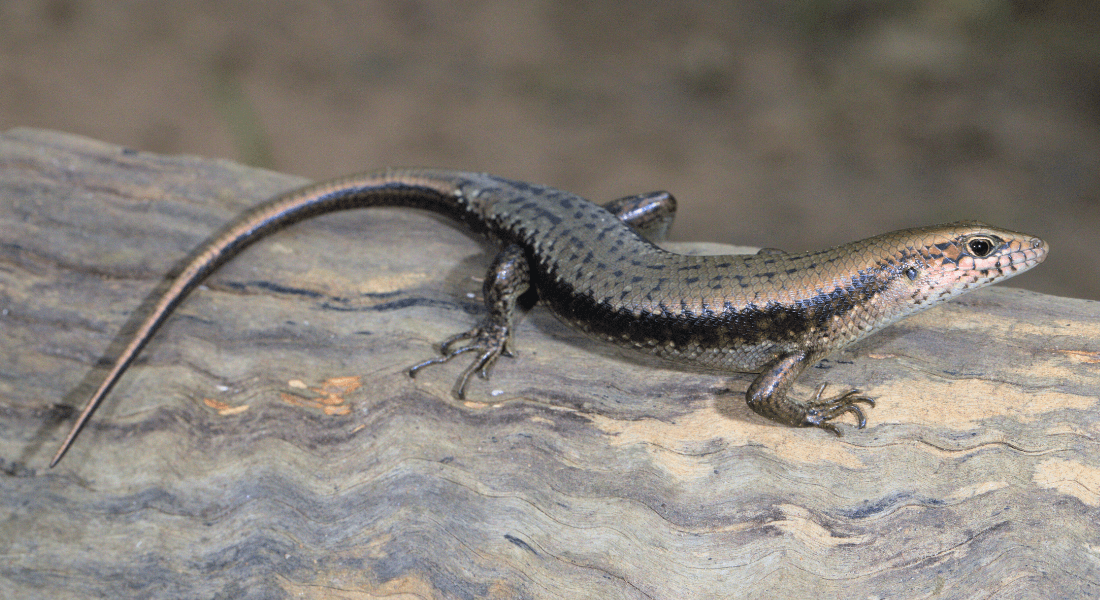New species named after CMEC researcher
After years of uncertainty, researchers have managed to identify an East African skink as a new species. The elusive lizard is named in honor of Harith Farooq, herpetologist and researcher at Center for Macroecology, Evolution, and Climate (CMEC), for his work on uncovering the region’s reptile diversity.

For more than two decades, a group of lizards in East Africa have left researchers puzzled. The lizards looked like the common speckle-lipped skink (Trachylepis maculilabris), but slight differences in appearance and behavior told otherwise. Despite genetic evidence, no one had officially named or described the reptile. Until now.
A new study published in Annals of Carnegie Museum has finally solved the puzzle. Led by Matheus Barbosa and an international team of researchers, the study reveals that the East African skinks are not just a regional variation, but a completely new species.
Skinks are a type of lizard with more than 1,500 described species. Skinks are found in a variety of habitats and ecosystems worldwide ranging from deserts and mountains to grasslands.
The newly described skink stands out with its striking orange side stripes and unique genetic signature. To reach the conclusion, the team examined nearly 400 museum specimens and analyzed DNA from over 200 individuals across Africa. Their findings showed that the East African populations, found in Mozambique, Malawi, Tanzania, and Kenya, form a distinct evolutionary branch, separate from their West and Central African cousins.
Snakes led the way
Named Trachylepis farooqii, in English "Farooq's skink", the species is named in honor of Mozambican herpetologist and Postdoctoral Researcher at Center for Macroecology, Evolution and Climate, Harith Omar Morgadinho Farooq (b. 1986), whose work has been instrumental in uncovering the region’s rich reptile fauna.

Harith Farooq has been professionally engaged in herpetology, the study of amphibians and reptiles, for 15 years even though it was the overall childhood fascination of animals that ignited his interest in biology, he explains:
- When I received my degree and started working as a biologist, I would do fauna inventories in Mozambique documenting everything from insects to mammals in the areas I visited. However, I noticed that people were very afraid of the snakes, and they would often kill anyone they saw, says Harith Farooq and continues:
- Eventually, I started to work more specifically with reptiles as a way of educating local communities about the value of biodiversity, and as time went by I ended up focusing solely on amphibians and reptiles. The more I studied them, the more I became a fan.
Recognition came as a surprise
Having a species named in your honor is a rare event, and for Harith Farooq the annoncement came as a surprise:
- The senior author, Luís Ceríaco, is a prolific researcher, and I often get his most recent publications on my WhatsApp. This time, I opened the PDF and skimmed the paper since it was about a species from my country. Here, I noticed my name, but not the justification section at the end, says Harith Farooq and continues:
- I thanked him and told him that he shouldn’t have bothered naming it after me. It wasn’t until the next day that my colleagues pointed out the beautiful dedication the authors wrote. It was quite emotional to read, and I will forever be grateful for the appreciation of my work.
The fact that Farooq’s skink, despite being noticeably morphologically different from its sister species, remained undescribed until recently, highlights the lack of studies in the region, where many species may still await formal description.
This discovery adds to a growing list of new reptile species described in recent years, underscoring the importance of continued fieldwork and museum research in revealing Earth’s hidden biodiversity. In particular, the researchers, as well as Harith Farooq, hope the discovery will draw more attention to the biodiversity of Southeastern Africa.
